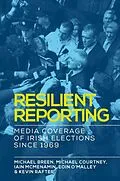This book examines how election news reporting has changed over the last half century in Ireland by means of a unique dataset involving 25m words from newspapers as well as radio and television coverage. The authors examine reporting in terms of framing, tone and the distribution of coverage.They also focus on how the economy has affected election coverage as well as media reporting of leaders and personalities, gender and the effect of the commercial basis of media outlets. The findings - drawn from a machine learning computer system involving a huge content analysis study - will interest academics as well as politicians and policymakers internationally.
Autorentext
The authors are based at Dublin City University, Ireland.Michael Breen is an Associate Professor at the School of Law and GovernmentMichael Courtney is a Statistician at the Irish Central Statistics OfficeIain McMenamin is Professor of Comparative Politics and Head of the School of Law and GovernmentEoin O'Malley is an Associate Professor at the School of Law and Government Kevin Rafter is Professor of Political Communication and Head of the School of Communications
Klappentext
Media hostility towards politicians and the political system, and its impact on democracy, has long attracted the interest of scholars of political communication. It is also the subject of political discourse and rhetoric, with the media attracting the ire of political leaders around the globe: Donald Trump, for one, has repeatedly called journalists 'the worst people in the world.' Trump is not the first, nor will he be the last, leader to seek to focus our attention on the role of the media in electoral politics. Resilient reporting examines how election news reporting has changed over the last half-century in Ireland by means of a unique dataset involving 25 million words from newspapers, as well as radio and television coverage. In a timely and revealing study, the authors examine reporting in terms of framing, tone, and the distribution of coverage. They also focus on how the economy has affected election coverage as well as media reporting of leaders and personalities, gender, and the effect of the commercial basis of media outlets. The authors evaluate three broad hypotheses about Ireland's election coverage since 1969: the extent to which the norms of critical impartiality have survived, whether the media has shifted towards hypercritical infotainment, and the extent to which content has been influenced by exogenous factors that is, political, social, and economic factors outside the media itself. The findings, which are drawn from a machine-learning computer system involving a huge content analysis study, will interest academics as well as politicians and policymakers internationally.
Inhalt
List of figuresList of tablesList of authorsAcknowledgements1 Resilient reporting: An introduction2 Ireland: political, economic, and media systems3 The media and political change4 The role of the economy in media coverage5 Gender bias and Irish election coverage6 Party leaders and personalisation of politics7 Commercialism and election coverage8 Economy and crisis coverageConclusionAppendix 1: An overview of elections in Ireland since 1969Appendix 2: Data and methodologyReferencesIndex
Titel
Resilient reporting
Untertitel
Media coverage of Irish elections since 1969
EAN
9781526120007
Format
ePUB
Hersteller
Veröffentlichung
16.04.2019
Digitaler Kopierschutz
Adobe-DRM
Dateigrösse
1.99 MB
Anzahl Seiten
192
Unerwartete Verzögerung
Ups, ein Fehler ist aufgetreten. Bitte versuchen Sie es später noch einmal.
